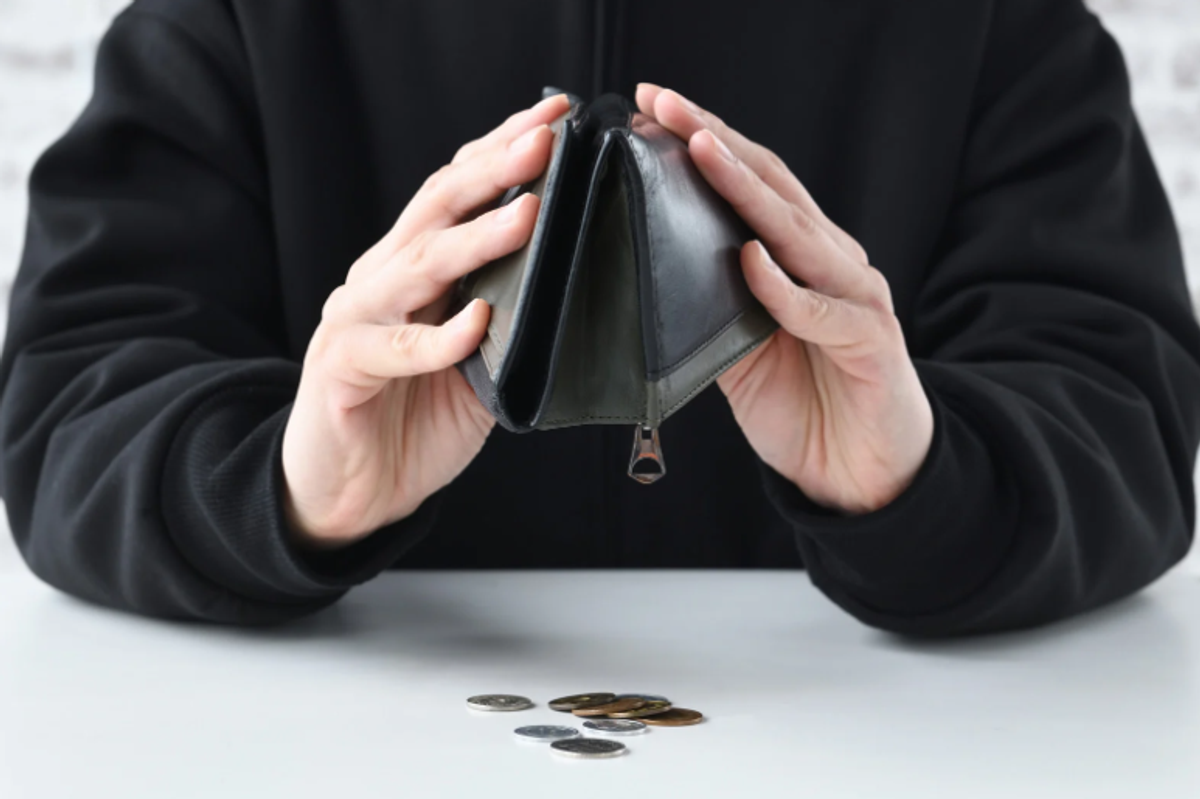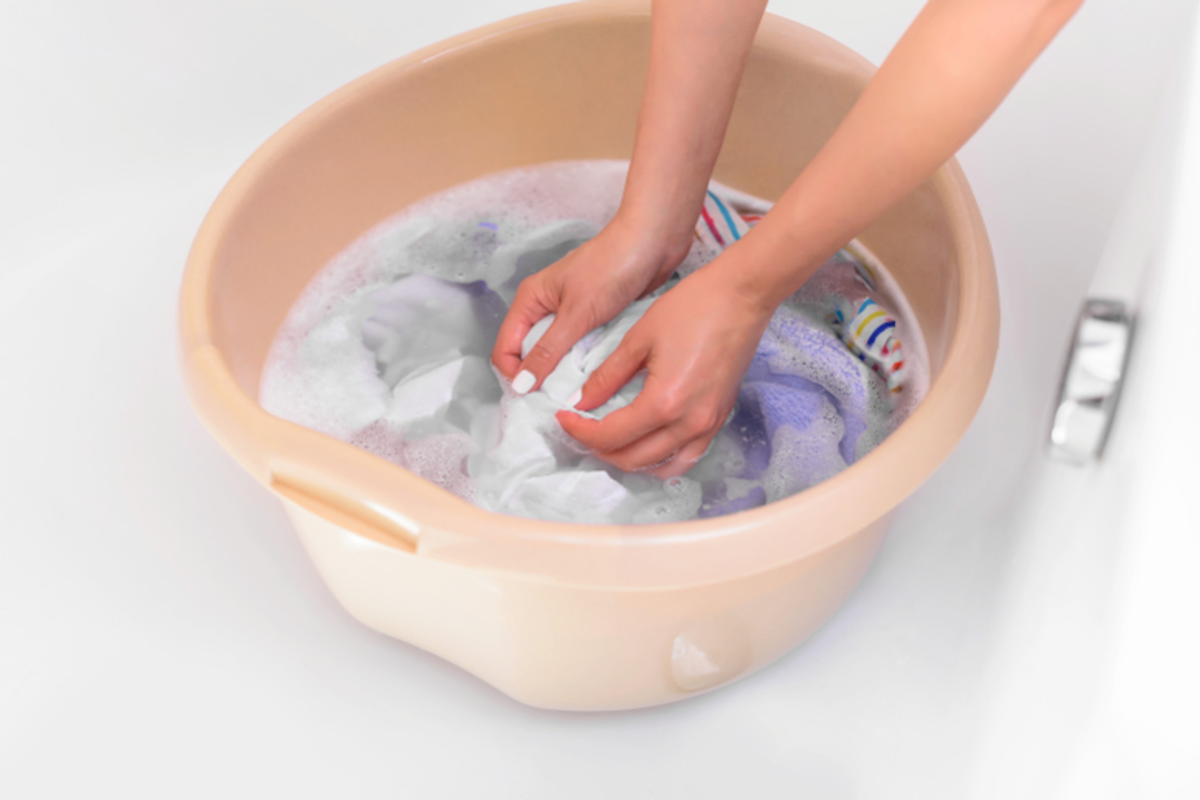There is rainwater seeping into my jeans, and my instructions are about to blow away. But my front yard could hold the cure to cancer, so I keep digging.
I am outside my home in Portland, Oregon, digging in the soil with a small plastic scoop I requested from the Natural Products Discovery Group at the University of Oklahoma. An interdisciplinary team of researchers are hard at work there, looking for fungi and natural products found in soil that may be used for a host of drugs and cures for cancer, infectious diseases, and even heart disease.
So the least I can do is get my knees wet.
That's me, going full science. Photo by Margaret Ryan for Upworthy.
It sounds like something from the future, but natural products have been used in drugs for thousands of years.
Soil is packed with teeny, tiny living elements, including millions of fungi. You can't see them without a microscope, but they're really good at making and emitting new compounds called natural products. And these natural products may be the microscopic molecules researchers need to slow down growing cancer cells or stop deadly pathogens in their tracks.
But this isn't an entirely new concept.
"On the one hand, people will argue that humans have been using natural products for millennia," said Dr. Robert Cichewicz, principal investigator for the Natural Products Discovery Group, before telling me about the poison that killed Socrates. But he admits modern scientists have been using natural products to create drugs since the turn of the 20th century.
And they've come a long way since then.
A researcher assessing soil. Photo via Dr. Robert Cichewicz/NPDG/University of Oklahoma, used with permission.
Since soils are home to so many fungi and natural products, researchers at the Natural Products Discovery Group have one of the dirtiest jobs in the biz.
A biologist and natural products expert, Cichewicz leads a team of researchers assessing soils to identify promising fungi and natural products that could be turned into compounds and maybe one day, life-saving drugs.
"[Drugs] aren't just created out of the thin air in a laboratory. It's a process," Cichewicz said. "Natural products have a long history of supplying roughly half of the drugs that are prescribed today. So we're continuing that search."
Hard at work in the laboratory, studying fungi. Photo via Dr. Robert Cichewicz/NPDG/University of Oklahoma, used with permission.
Cichewicz and his team assess soil samples from all across the country to look for natural products that appear promising for slowing down cancer, attacking microbial infections, and inhibiting parasitic diseases.
The fungi and natural products can vary widely from neighbor to neighbor, or even front yard to backyard, so every sample counts.
"What we look at as a homogeneous yard is really a complex matrix of different types of micro-environments," Cichewicz said.
This is where you — yes, you! — and your matrix of a yard come in.
Photo by Margaret Ryan for Upworthy.
Cichewicz and his team are looking for soil samples from citizen scientists, no Ph.D. required.
The team is looking for people to take soil samples from their yards for use in their research. Individuals across the country can participate and request a free collection kit online. The kit includes instructions, a small scoop, a plastic bag for your sample, and a pre-paid envelope to mail your soil back.
Mine arrived two business days after I submitted my request online, and I soon found myself hard at work in my front yard. Short of a couple of soggy knees, collecting the sample was easy.
Just use the supplied scoop to get a few tablespoons of soil.
Photo by Margaret Ryan for Upworthy.
Then seal the bag tight before placing it in the pre-paid envelope.
Photo by Margaret Ryan for Upworthy.
You also have to answer a few questions about your soil, but it's nothing too tricky.
Photo by Margaret Ryan for Upworthy.
Once you submit your sample, you'll be able to track it online and eventually see the types of fungi and natural products found in your soil. It's a rare chance to get a closer look at what's under your feet every day, and it's a chance for you to play an active role in some amazing research.
A picture of the samples as they move through the testing process, which can take up to a year. Photo via Dr. Robert Cichewicz/NPDG/University of Oklahoma, used with permission.
The best part? Fungi from your soil could end up at the National Cancer Institute.
Cichewicz is working with the National Cancer Institute to make the entire collection of fungi free to researchers.
This means researchers or teams with different goals — whether it's drugs and cures for Alzheimer's, heart disease, or Parkinson's — wouldn't need to start their own collection from scratch.
"Natural products as a field has traditionally involved everybody going their own way, finding their own organisms whether they're in the jungles of South America, the frigid waters of Antarctica, or right here in Oklahoma," Cichewicz said. "This would be really a game-changer, in that, 'Here's a collection. Focus on producing new drug leads.'"
Access to this fungi library could save countless amounts of time and money and frees up the nation's top researchers to do what they do best: find compounds that work.
Photo via Dr. Robert Cichewicz/NPDG/University of Oklahoma, used with permission.
I sealed my soil and survey in the envelope and rested it gingerly on my kitchen table. After all, it's precious cargo.
Photo by Margaret Ryan for Upworthy.
Later, on my walk to the mailbox, I caught myself looking closely at my neighbors' yards for the first time. What secret does their soil hold? Maybe those flowers are so tall because they're rooted in possibility. Is there a cure for Alzheimer's under those cherry blossoms?
Maybe. Maybe not.
But since many of us know or will know someone who could benefit from this vital research, it can't hurt to look.



 Student smiling in a classroom, working on a laptop.
Student smiling in a classroom, working on a laptop. Students focused and ready to learn in the classroom.
Students focused and ready to learn in the classroom.
 Broke woman with her empty wallet.
Broke woman with her empty wallet. Man eating a plate of pancakes.
Man eating a plate of pancakes. Washing clothes by hand
Washing clothes by hand
 Fish find shelter for spawning in the nooks and crannies of wood.
Fish find shelter for spawning in the nooks and crannies of wood.  Many of these streams are now unreachable by road, which is why helicopters are used.
Many of these streams are now unreachable by road, which is why helicopters are used. Tribal leaders gathered by the Little Naches River for a ceremony and prayer.
Tribal leaders gathered by the Little Naches River for a ceremony and prayer.

 Teenagers hanging out at a park.
Teenagers hanging out at a park.